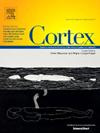一个关于图形复制任务中封闭行为的20年故事:重新审视德拉·萨拉在痴呆症和中风患者新样本中的发现。
IF 3.2
2区 心理学
Q1 BEHAVIORAL SCIENCES
引用次数: 0
摘要
闭合行为(CIB)的特征是将图形副本放置在待复制刺激的附近(near CIB)甚至顶部(Overlap CIB)。尽管CIB在文献中很少受到关注,但塞尔吉奥·德拉·萨拉及其同事对理解这一现象做出了重要贡献。他们指出,CIB经常在阿尔茨海默病中观察到,但也存在于其他形式的痴呆、轻度认知障碍和中风中;他们认为CIB可能反映了执行功能的缺陷,而不是工作记忆的缺陷,而且这种现象在双重任务条件下更频繁发生。重要的是,他们证明了CIB可能不是特定于复制的,而是反映了运动位置与注意力焦点解耦的普遍缺陷。在本研究中,我们在106名参与者的混合样本中探讨了这些观察结果(AD n = 37,额叶中风n = 25,其他形式的痴呆n = 24,正常对照n = 20)。首先,我们证实CIB在阿尔茨海默病、其他形式的痴呆和额叶中风中同样常见。其次,我们证实了CIB与执行功能缺陷之间的联系。第三,我们发现CIB患者在双重任务情境下更有可能表现出这种现象,在双重任务情境下,画线与一个不相关的次要任务(敲击、计数或向后计数)有关。本研究支持并扩展了Della Sala及其同事的研究成果,即当任务的一般注意负荷增加时,CIB会增强。本文章由计算机程序翻译,如有差异,请以英文原文为准。
A 20-year tale on closing-in behavior in graphic copying tasks: Revisiting Della Sala's findings in new samples of patients with dementia and stroke
Closing-in behavior (CIB) is characterized by the placement of the graphic copy near (Near CIB) or even on the top of (Overlap CIB) the stimulus to be reproduced. Although CIB has received little attention in the literature, Sergio Della Sala and colleagues made important contributions to the understanding of the phenomenon. They noted that CIB is often observed in Alzheimer's Disease but is also present in other forms of dementia and mild cognitive impairment and stroke; they argued that CIB may reflect a deficit in executive function, rather than working memory, and that the phenomenon occurs more frequently in dual task conditions. Importantly, they demonstrated that CIB may not be specific to copying but may instead reflect a general deficit in decoupling movement location from the focus of attention. In the present study, we explored these observations in a mixed sample of 106 participants (AD n = 37, frontal stroke n = 25, other forms of dementia n = 24, and normal controls n = 20). First, we confirmed that CIB is equally common in AD, other forms of dementia and frontal stroke. Second, we confirmed the association between CIB and executive function deficits. Third, we showed that individuals with CIB are more likely to exhibit the phenomenon in dual task situations, in which line-drawing is associated with an unrelated secondary task (tapping, counting, or counting backward). The present work supports and extends the contributions of Della Sala and colleagues demonstrating that CIB is enhanced when the general attentional load of the task increases.
求助全文
通过发布文献求助,成功后即可免费获取论文全文。
去求助
来源期刊

Cortex
医学-行为科学
CiteScore
7.00
自引率
5.60%
发文量
250
审稿时长
74 days
期刊介绍:
CORTEX is an international journal devoted to the study of cognition and of the relationship between the nervous system and mental processes, particularly as these are reflected in the behaviour of patients with acquired brain lesions, normal volunteers, children with typical and atypical development, and in the activation of brain regions and systems as recorded by functional neuroimaging techniques. It was founded in 1964 by Ennio De Renzi.
 求助内容:
求助内容: 应助结果提醒方式:
应助结果提醒方式:


